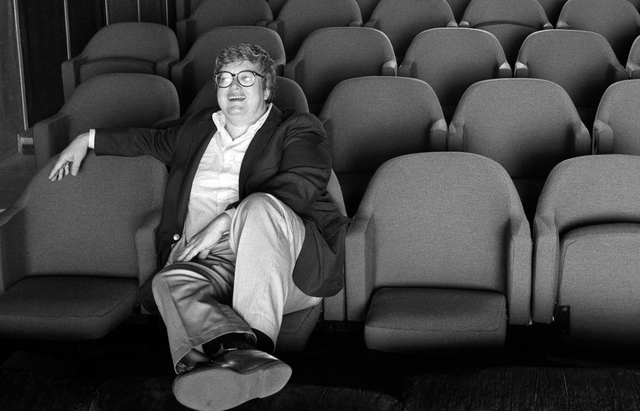 (Photo: Sundance Institute)
(Photo: Sundance Institute)
The movies, Roger Ebert said, “are like a machine that generates empathy… It helps us to identify with the people who are sharing this journey with us.” Life Itself, an engrossing new documentary based on Ebert’s memoir of the same name, inspires more than its share of empathy as it chronicles its subject’s final days. But the film by Hoop Dreams director Steve James also generates a sense of wonder. How did a chubby know-it-all from Urbana, Illinois, come through decades of alcoholism and loneliness to redefine film criticism and become one of the country’s greatest popular writers?
It’s a journey worth taking, even if you know the broad outlines of Ebert’s life: an early love of writing leads him to newspapers, where he becomes a general-assignment reporter at the Chicago Sun-Times. The then-undistinguished job of film critic falls in his lap, and he throws himself into it, winning the Pulitzer Prize in 1975. That same year, Ebert begins his career in television, a move that will ultimately make him the most famous critic in America. At the age of 50, he marries for the first time, and his wife, Chaz, becomes a central figure in his life, managing his affairs and becoming his caregiver after cancer takes his voice.
A JOURNEY WORTH TAKING
James chronicles these turns with sophistication and wit, drawing on more than two dozen interviews with Ebert’s family, co-workers, and friends in the movie industry. (The best of these is a characteristically ludicrous appearance from director Werner Herzog, whose roughly 90 seconds in the movie alone make Life Itself worth seeking out.)
The tricky thing about Life Itself is taking Ebert’s enormous output of text and turning it into cinema. There’s plenty of Ebert on video, of course, but the film pays great deference to Ebert as a writer, layering text on the screen and including lengthy passages of voiceover from the memoir. “One of the things we wanted to do was to show what a great writer he was,” James told me in an interview this week after the film’s premiere at the Sundance Film Festival. “I wanted Roger to be the narrator of the film.”
Of course, you can’t tell the story of Ebert without including the man most closely associated with him. In 1975, after some early experiments with public television, Ebert hooked up with crosstown rival Gene Siskel of the Chicago Tribune. Their work together, first at Sneak Previews and later with At the Movies, introduced a generation to films both popular and independent, and to the language of criticism. Without Siskel & Ebert it seems unlikely that I would have spent high school arguing with my friend Michael about the relative merits of Fargo, Pulp Fiction, and (yes) Hoop Dreams, all of which we had gone to see only after they’d received two thumbs up.
“I WANTED ROGER TO BE THE NARRATOR OF THE FILM.”
The story of Siskel and Ebert’s complicated partnership has been told before, and the film offers the usual raucous clips of the rivals arguing. But Life Itself enlivens the tale with new details: it reveals that Siskel, who appeared on television as something of a square, was once a member of Hugh Hefner’s coterie and attended topless pool parties at the Playboy Mansion. And it contains the first in-depth interview with Siskel’s widow, Marlene Iglitzen, who recounts Siskel’s mounting fears that Ebert would leave the show to go solo, leaving him without his partner. (Siskel died from a brain tumor in 1999.)
But the film’s greatest drama may lie in its own making. James began interviewing Ebert only in the last several months of the critic’s life. And while Ebert’s memoir gives the film its structure, James sought to go beyond it to show his subject’s life after he published his book in 2011. Cancer of the jaw caused Ebert to lose his voice, along with the ability to eat or drink, and Life Itself offers an unflinching portrait of a dying man. It can be brutal: the first scene in which Ebert appears finds him in the hospital, receiving suction in his airway. “It was a way of saying right up front, here you go: this is the guy you’re going to see in this movie. Get over it,” James told me. “And I hope people do get over it. I hope you get to a place where you see it’s still Roger, and you see past the infirmities.”
IT CAN BE HARD TO WATCH
In Ebert’s final days, James sends him a nine-page list of questions he hopes to answer. But Ebert, normally generous in his emailed replies, responds only: “I can’t.” He dies soon thereafter, surrounded by Chaz and other friends and family. James is sanguine about the abrupt loss of access to his subject: “Ultimately, part of what filmmaking about is making a film from what you get, not what you wanted to get,” he says.
Life Itself takes what James and his crew captured and turns it into a fitting tribute. And it gives a fair hearing to some of the more pointed criticisms of Ebert’s work: that he was a sharper critic when he was younger; that he became too friendly with the filmmakers he critiqued; and that his thumb-based method of reviewing robbed film criticism of nuance.
But few can deny that Ebert helped introduce millions of people to great films — and smart criticism — that they would never have seen otherwise. Ebert was more than just a famous critic; he elevated the medium through his criticism. Life Itself is the tribute he deserves.
Source: The Verge

Leave A Comment
You must be logged in to post a comment.